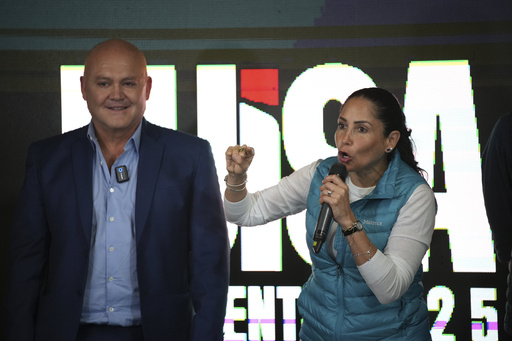
GUAYAQUIL, Ecuador — The upcoming presidential runoff in April is poised to assess the enduring impact of former leftist President Rafael Correa as his protégé, lawyer Luisa González, faces off against the conservative incumbent Daniel Noboa.
In the initial round of voting held recently, both candidates failed to secure an outright majority; however, they significantly outperformed the other 14 contenders, coming within a narrow margin of each other as per the results released.
This runoff mirrors the recent snap election prompted by the dissolution of the National Assembly, an event that paved the way for Noboa to take on a truncated 16-month presidency. The wealthy businessman, in his campaign, placed a strong emphasis on tackling the escalating crime rates that have plagued Ecuador in recent years.
As was the case in 2023, González is appealing to voters’ feelings of nostalgia for Correa’s governance from 2007 to 2017, an era that predates the current drug trafficking crisis and was characterized by Correa’s expansive economic policies.
Voters expressed their decision Sunday in relation to their views on Correismo, with many longing for the decreased crime and unemployment that marked Correa’s tenure, often overlooking his authoritarian traits, significant debt accumulation, and a 2020 corruption-related conviction rendered in his absence.
On the other hand, many Noboa supporters noted that their votes largely represent a rejection of Correismo rather than a robust endorsement of Noboa’s anti-crime measures and governance thus far.
Last year, Noboa faced public discontent when he permitted power outages of up to 14 hours, attributing them to a severe drought, and his subsequent decision to deploy the military in addressing drug trafficking issues drew skepticism.
The close race reflects Noboa’s struggle to engage various societal sectors that remain apprehensive about a resurgence of Correismo, according to an expert on the Andean region. Additionally, there is growing apprehension regarding his management of the energy crisis and criticisms regarding the perceived overreach of authority in combating drug-related crimes.
As per the figures from Ecuador’s National Electoral Council, with over 92% of ballots counted, Noboa garnered approximately 4.22 million votes, representing 44.31%, while González followed closely with around 4.17 million votes, or 43.83%. The remaining 14 candidates trailed considerably behind these frontrunners.
With the runoff set for April 13, both candidates will intensify their campaigns seeking to secure a full four-year term. In Ecuador, voting is mandatory, and authorities reported that over 83% of the approximately 13.7 million eligible voters participated in the initial round.
This event marks the fourth consecutive occasion where a candidate linked to Correa’s movement has failed to win outright in the first round. Noboa, 37, and González, 47, were identified as the leading candidates prior to the election.
González has held multiple governmental positions throughout Correa’s administration and served as a lawmaker until May 2023, coinciding with the National Assembly’s dissolution initiated by then-President Guillermo Lasso.
As they campaign in the upcoming months, both contenders must seek broader support among both pro-Correa and anti-Correa voters, as well as affiliations with smaller political factions, such as that of indigenous leader Leonidas Iza, who finished in a distant third place in the initial round.
An observer noted that while Noboa may need to adopt a more aggressive stance against Correismo, this poses a dilemma, since his initial appeal largely stemmed from his youth and his message of unity amid prevailing polarization.
The April election will be a crucial test to see if Correismo can rally a greater voter turnout in runoff elections compared to its previous efforts. Despite a loyal following, challenges remain for Correismo to connect with moderate voters and those less attached to either political camp.
Ecuador has seen a troubling rise in violence linked to cocaine trafficking, primarily fueled by criminal organizations in neighboring Colombia and Peru, making this a primary concern among voters.
Under Noboa’s leadership, the homicide rate dropped from 46.18 per 100,000 in 2023 to 38.76 per 100,000 last year, yet these figures still pose a stark contrast to the much lower rate of 6.85 per 100,000 in 2019. Other crimes, including kidnappings and extortions, have surged, leaving many residents fearful.
Furthermore, Noboa’s controversial tactics have ignited debates over the limits of executive power. His declaration of a state of war against drug gangs in January led to a military mobilization that critics have deemed excessive. Additionally, decisions such as permitting a police raid on Mexico’s embassy to arrest fugitive ex-Vice President Jorge Glas have been met with significant backlash.
Significant power outages last year led to substantial business losses, with estimates around $7.5 billion, a figure attributed to drought conditions; however, accompanying data to validate this claim was not provided by Noboa’s administration.
While Noboa excelled at harnessing social media for political engagement, experts suggest he has struggled to genuinely connect with the electorate outside this digital domain. Moving forward, it will be essential for him to present himself as a democratic leader committed to upholding the rule of law.

